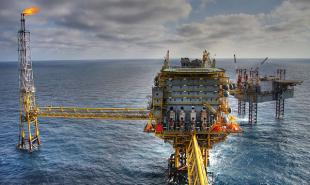
We have said before, the collapse of the Petrodollar will be the harbinger of higher Gold prices. The fundamentals of oil are not helping as we see below.
Oil Price Collapse Is ‘Permanent’; Analyst Says Fossil Fuel Has Had Its Day
via SRSrocco
(by Jillian Ambrose – Postmedia Network)
“I usually put a £5 bet on the oil price — and I’m collecting,” smiles Professor Dieter Helm.
It’s not difficult to imagine his tally of modest wagers adding up. The highly regarded Oxford University economics professor is a long-time industry observer. Today, he is in central London after taking meetings with major oil executives. He is also a familiar face in Whitehall and Brussels, where he advises, both formally and informally, on the trends reshaping the global energy markets.
Still, his stakes will be trillions of dollars lower than the energy leaders he advises.
 If Helm is to be believed the oil market downturn is only getting started. The latest collapse is the harbinger of a global energy revolution which could spell the end-game for fossil fuels. These theories were laughable less than a decade ago when oil prices grazed highs of more than $140 a barrel. But the burn out of the oil industry is approaching quicker than was first thought, and the most senior leaders within the industry are beginning to take note.
If Helm is to be believed the oil market downturn is only getting started. The latest collapse is the harbinger of a global energy revolution which could spell the end-game for fossil fuels. These theories were laughable less than a decade ago when oil prices grazed highs of more than $140 a barrel. But the burn out of the oil industry is approaching quicker than was first thought, and the most senior leaders within the industry are beginning to take note.
In the past, the International Energy Agency (IEA) has faced down criticism that its global energy market forecasts have overestimated the role of oil and underplayed the boom in renewable energy sources. But last month the tone changed. The agency warned oil and gas companies that failing to adapt to the climate policy shift away from fossil fuels and towards cleaner energy would leave a total of $1 trillion in oil assets and $300bn in natural gas assets stranded.
For oil companies who heed Helm’s advice, the route ahead is a ruthless harvest-and-exit strategy. This would mean an aggressive slashing of capital expenditure, pumping of remaining oil reserves while keeping costs to the floor and paying out very high dividends.
“They’d never do it because no company board would contemplate running a smaller company tomorrow than today. It’s not in the zeitgeist of the corporate world we’re in, but that’s what they should do,” Helm says.
BP and Royal Dutch Shell are slowly shifting from oil to gas and making even more tentative steps in the direction of low-carbon energy. But Helm is not entirely convinced that oil companies have grasped the speed with which the industry is undergoing irrevocable change.
“As the oil price fell, at each point, oil executives said that the price would go back up again,” says Helm. “What the oil companies did was borrow to pay their dividends on the assumption that this is a temporary problem. It’s my view that it is permanent,” he adds.
For a start, there is scant precedent for the price highs of recent decades. Between 1900 to the late Sixties oil prices fluctuated in a range between $15 a barrel to just above $30 a barrel – even through two world wars, population growth and a revolution in transport and industry.
It was geopolitical events which caused oil prices to surge by more than $100 a barrel following the Middle East oil embargoes of the late sixties and early seventies. They collapsed back to $20 by the Eighties.
So, what drove oil prices to the heady levels of $140 a barrel just less than 10 years ago?
“China,” says Helm, barely missing a beat. “If you look at both the rapid growth in emissions and the rapid growth of oil, fossil fuel and all commodity prices, it was while China was doubling its economy every seven years. This is a phenomenal rate.
“It’s all very well to say that with hindsight now, but no one anticipated that this enormous, energy intensive growth would happen,” he adds.
The global oil market has managed to cling on to a fragile recovery with prices now rattling between $50 and $55 a barrel, but Helm argues that the economic drive to keep producing even as the industry shifts to a low carbon future means prices may continue to fall — forever.
“As prices come down you’d expect producers to supply less — that’s normal economics. On the contrary, in oil as output falls the production goes up. Why? Because the marginal cost of production in the Middle East is around $10 and the marginal cost in Russia is $20. So even at $50 you’re making a profit. And if you’re an authoritarian regime and you need $100 oil to balance the country’s budget while surrounded by radicals and insurgents, then you pump as much as you can,” Helm says.
“Even if you’re getting less per barrel, you must get the money to keep your budgets going. And that’s exactly what has happened,” he says of the inevitable price collapse.
“Slowly companies have adjusted to the idea that maybe we won’t see $100 oil again. Then, maybe not even $80 to $90. Now, even $60 oil seems a bit aspirational. But there is still a dominant zeitgeist within the oil majors that there is one last hoorah to come. I don’t think there is,” he adds.
The two major demand centres for oil are petrochemicals and transport fuel. The theory previously held in the corridors of major oil company headquarters is that increasing affluence in Asia means that soon more and more families will own two cars. As population booms the number of cars on the road could increase exponentially, requiring millions of barrels of oil to produce the petrol which will fuel the resulting automobile revolution.
But slowly, the oil companies are beginning to come around to Helm’s view that the burgeoning market for electric vehicles may have been underestimated and could radically change the outlook for oil demand.
In its latest annual report on future energy trends BP admitted that it is bracing itself for a revolution in electric car use that could halve the demand of drivers for oil.
In previous years the oil major has downplayed the potential of electric cars in dampening demand but has now almost doubled the number of electric vehicles it expects on the world’s roads in 2035 from 57 million in last year’s report to 100 million.
In addition to the soaring popularity of low-cost electric taxis and falling costs of electric battery storage, more people in emerging economies are expected to become car-owners for the first time, and will be buying electric or high efficiency vehicles.
“Everyone is repeatedly surprised at how fast electric cars are coming forward, but the political pressure to adopt this technology is increasing all the time. And it’s not due to concerns over climate change — it’s city air pollution,” Helm says.
BP’s chief economist, Spencer Dale, added that the company is also preparing to study the future impact of artificial intelligence technology and 3D printing which could dramatically reduce the energy used in manufacturing and shipping parts.
“Many low-cost producers have rationed supply with a view that if they do not produce a barrel today they can produce a barrel tomorrow,” Dale said earlier this year. “I think it is increasingly likely that there will be technically recoverable oil reserves which will never be extracted.”
Typically BP’s focus has been 60% oil and 40% gas but this trend flipped last year as the major focused more on gas for the first time.
The global dash for gas is a multi-billion-dollar bet that Shell was happy to take last year, when it defied tumbling oil market prices to snap up BG Group for pounds £40 billion. The former British Gas subsidiary is now a global leader in producing and transporting gas that is compressed into liquid form to be carried on tankers and sold on the international market.
After the oil market downturn, Shell says the new BG tie-up will be a springboard to profitability in the near term and will help to “future-proof” the company against diminishing demand for oil.
Helm says the low-demand trend is reinforced by one further complexity.
“Suppose you’re sitting in Saudi Arabia: until now you’ve been reasonably confident in assuming that if you don’t pump the oil today it will be worth more tomorrow. But if you believe in my view that oil will be worth even less tomorrow, then what do you do? You pump even more now which will take the price down even further,” he says
“Short of a nasty war — which itself would bring a price spike but not a recovery — I can’t see any reason for oil prices to go up,” Helm says. “Curiously, I think many of the people in oil companies agree with me on that. What they don’t agree with is the short term.”
So, is BP’s Spencer Dale likely to be reaching for a fiver any time soon?
Helm laughs. “For most of the second half of the last decade I have been the odd maniac in the room – the madman who thought that prices were going to fall,” he said.
There has been no bet with Dale, but if Helm is eager to take on BP’s top forecaster he isn’t showing it. He’s probably won enough wagers already.
Article can be found here: Oil price collapse is ‘permanent’; analyst says fossil fuel has had its day.
This was an excellent article by Jillian Ambrose. Here we can see that more analysts understand the dire ramifications facing the oil industry going forward.
However, I don’t place a lot of faith in Electric Vehicles (EV’s) taking the place of the internal combustion engine. If we wanted to do so, we should have made the transition 25-30 years ago.
We have just run out the clock.
Check back for new articles and updates at the SRSrocco Report. You can also follow us at Twitter, Facebook and Youtube below:
Read more by Soren K.Group







